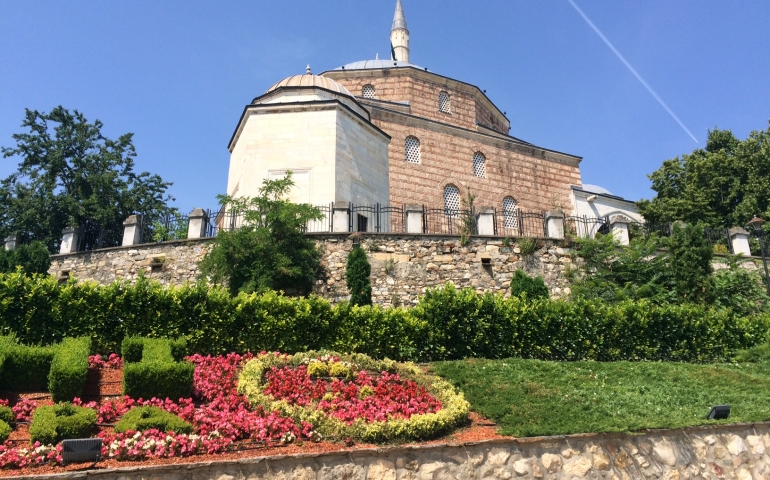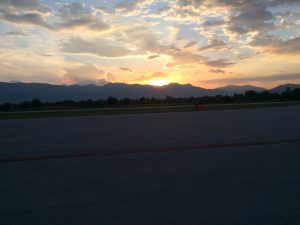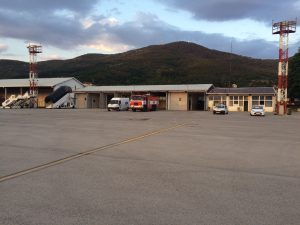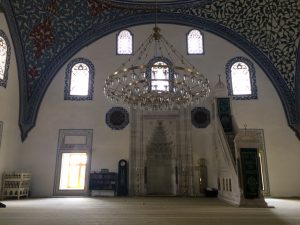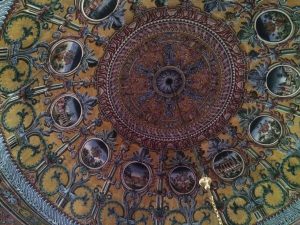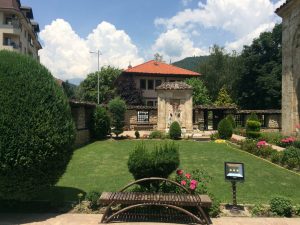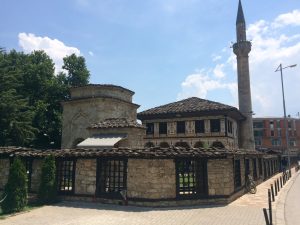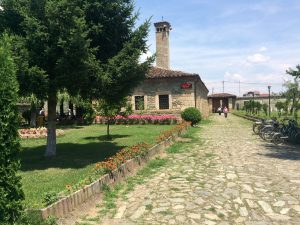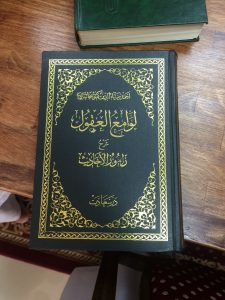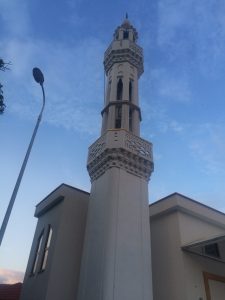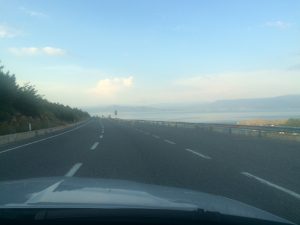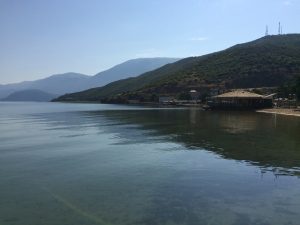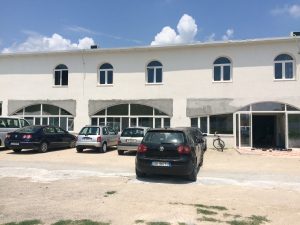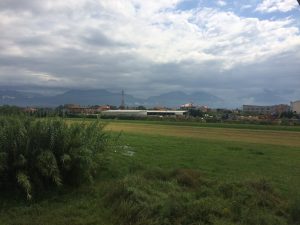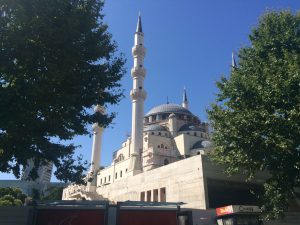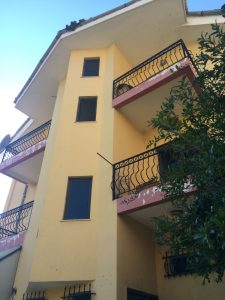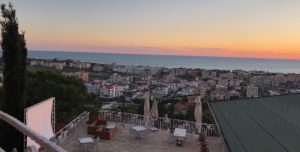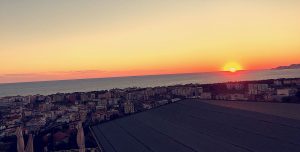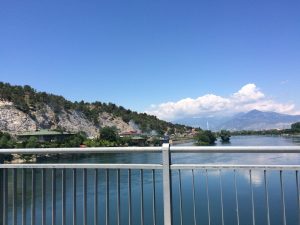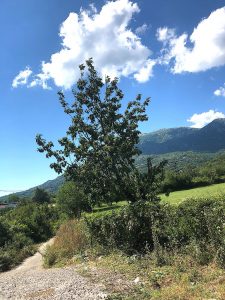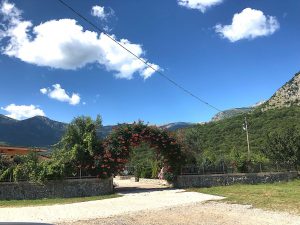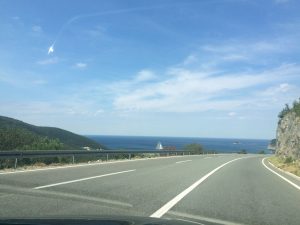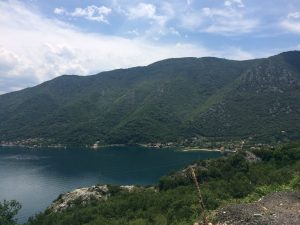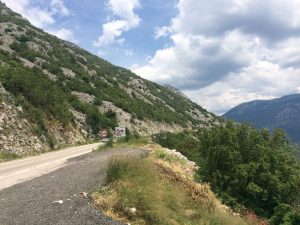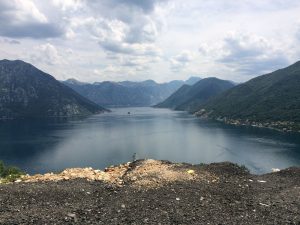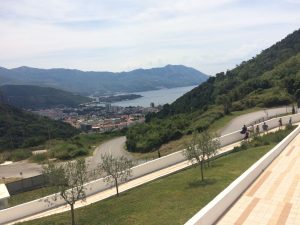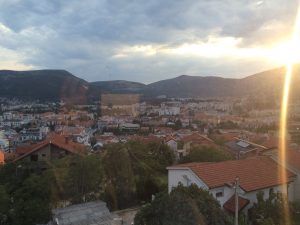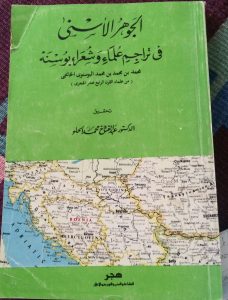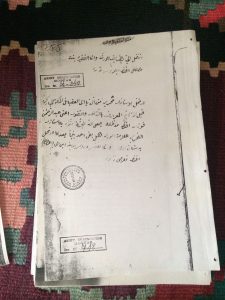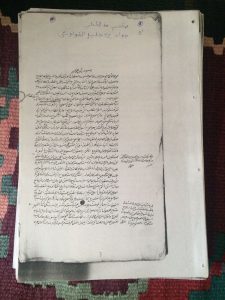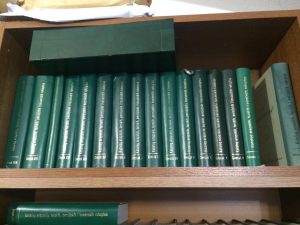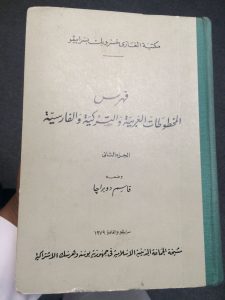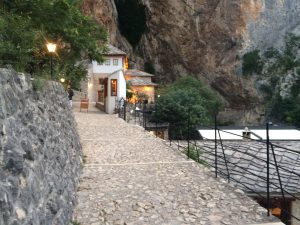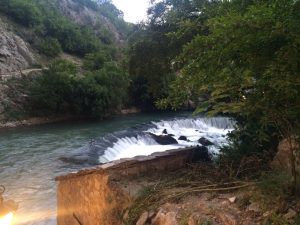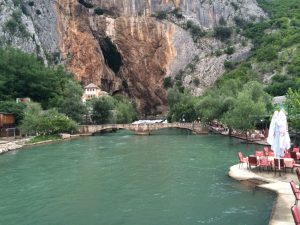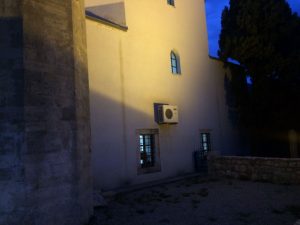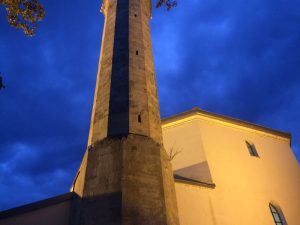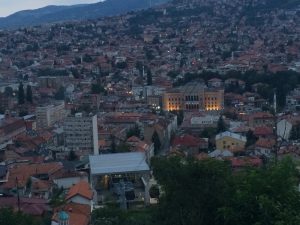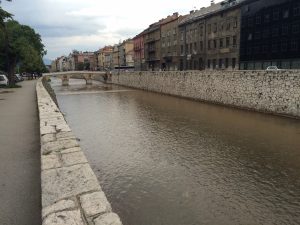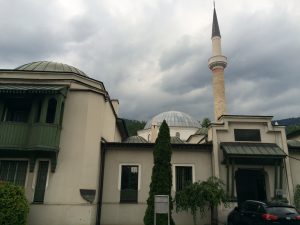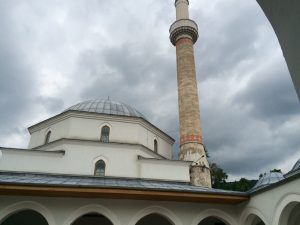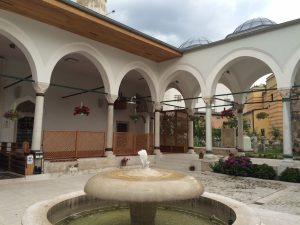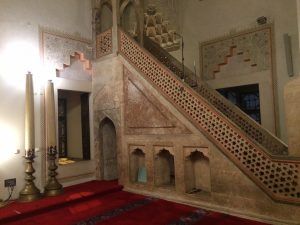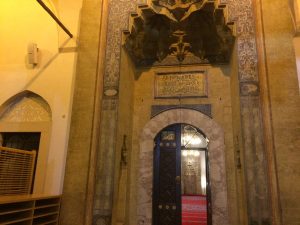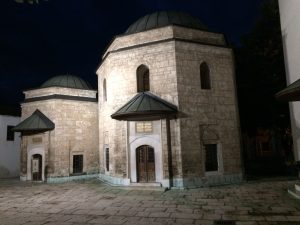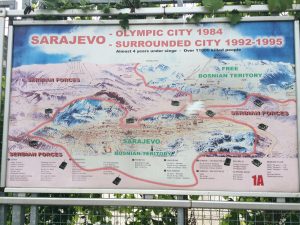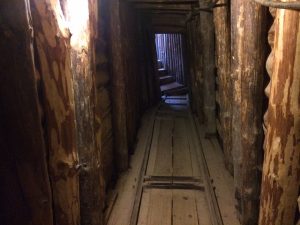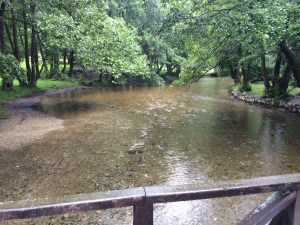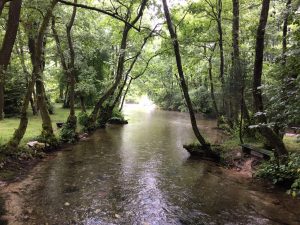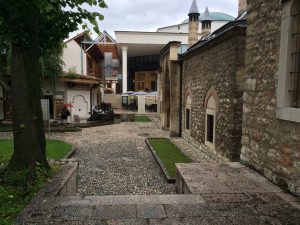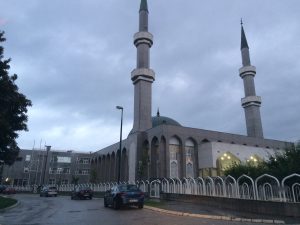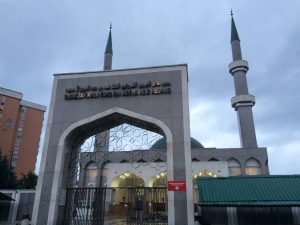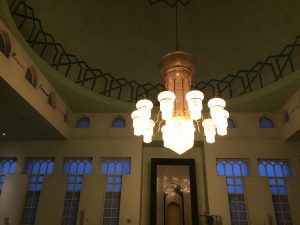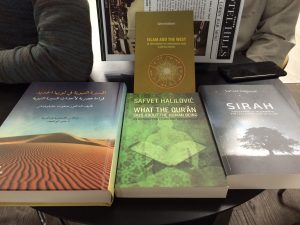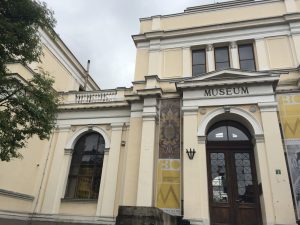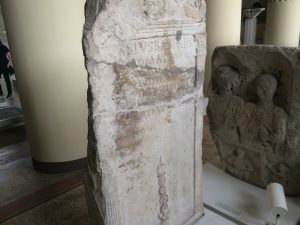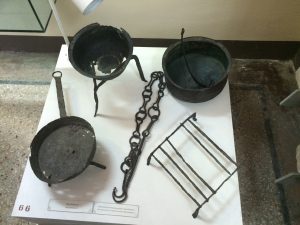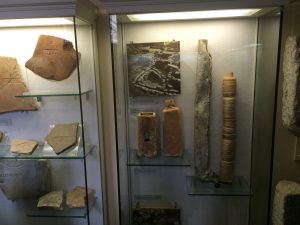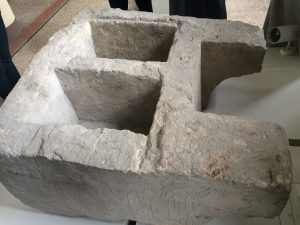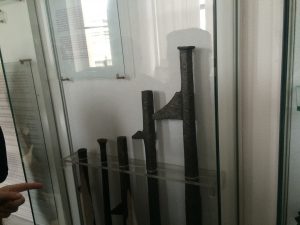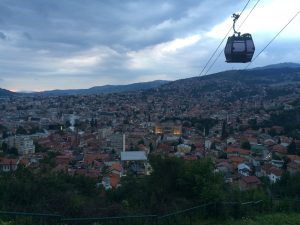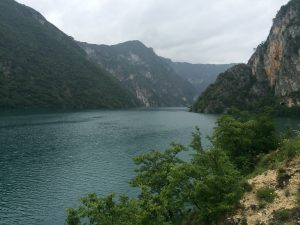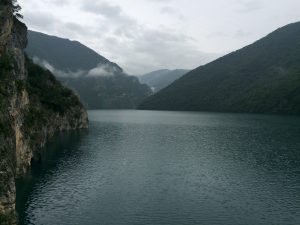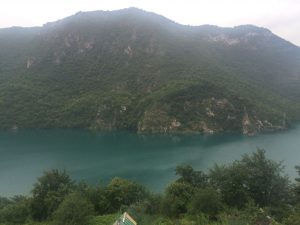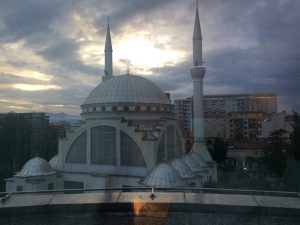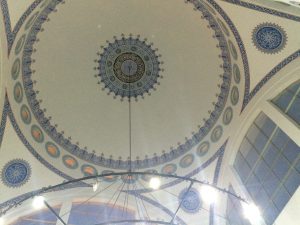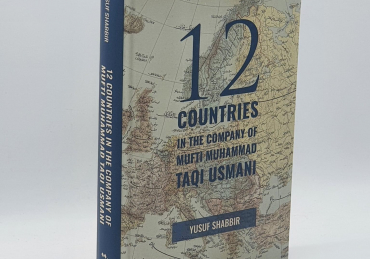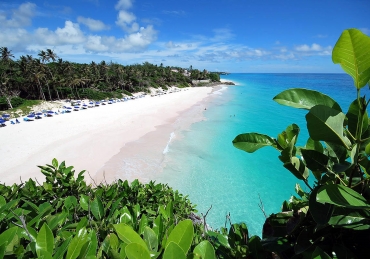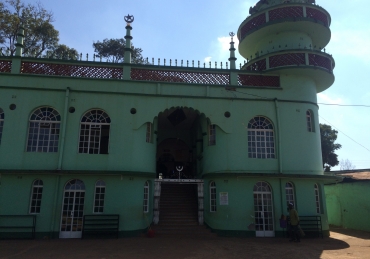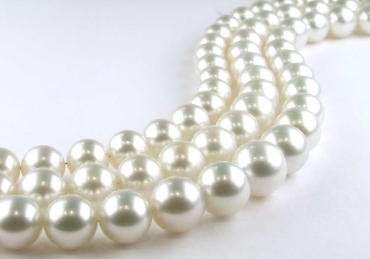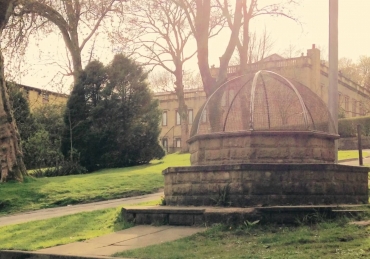12 day tour of the Balkan States in the company of Mufti Muhammad Taqi Usmani, Mufti Ahmed Khanpuri, Mufti Shabbir Ahmed and other scholars
In the name of Allah, the Compassionate the Merciful
Day 1 – Wednesday 20 June 2018
Woman accepts Islam in the air
It has always been my ardent desire to visit the Balkan countries. For several years, my colleague Shaykh Hanif Dudhwala of Muslim Welfare Institute (MWI) and his colleagues have been insisting on visiting Albania where the charity has been operating various education and charity programmes for over two decades. The suffering of our brethren in this region due to decades of communism and the massacres in Bosnia in the 1990s are other reasons for wanting to visit this region. Through the mercy and blessing of Allah Almighty, a few months ago our beloved Mufti Ahmed Khanpuri, the Grand Mufti of the Indian state of Gujarat, who visits the UK every year after Ramadan agreed to visit the Balkan states with MWI. As the programme was being developed, our beloved Shaykh al-Islam Mufti Muhammad Taqi Usmani also agreed to join the visit and travel directly from Pakistan to the region. The purpose of this trip is to understand the needs of the Muslims in the region and also be part of the charity’s current and future efforts.
Our journey begins at 5am in the morning as I drive Mufti Ahmed Khanpuri Sahib and his colleagues from Blackburn to London Luton Airport. It has been a hectic three days with over thirty programmes across the country. Today is no different. Our first stop is Darul Uloom Leicester where the commencement of Sahih Bukhari takes place. This is followed by a similar programme at Bury Park Educational institute in Luton. From here we head to Luton Airport. Joining us in this journey are thirty scholars and businessmen including Mawlana Ebrahim Pandor, Mufti Shabbir Ahmed, Mufti Abdussamad Ahmed, Mufti Mahmood Bardoli, Dr Mahmood Chandia, Mufti Ebrahim Raja, Shaykh Muhammad Ahmed of Ummah Welfare Trust (UWT) and Haji Afzal Memon from India. We found out later that this is the first time such a large group of scholars and prominent Muftis are visiting Macedonia.
Our three-hour flight to Ohrid is scheduled at 3pm and eventually the flight does take off notwithstanding the unprofessionalism of the airport staff and the disorganised management. During the flight, I discuss several issues with Mufti Ahmed Khanpuri, including the permissibility of performing Nafl Salah after Eid Salah without restricting it to the house, a restriction not mentioned by Imam Muhammad, Allamah Sarakhsi, Allamah Kasani, Allamah Ibn Mazah or Imam Qadi Khan. Mufti Sahib suggests that in principle Fatwa will be given on what Imam Muhammad has written and one should look at the origin of the restriction in terms of whose view it is and which era it originates from (when I asked Mufti Muhammad Taqi Usmani a few days later, he suggested that it is possible the restriction was implicitly understood from the earlier texts because Salah is not normally performed after Eid Salah in the Musalla al-Eid). Mufti Ahmed Sahib adds that when he studied the Ifta course in Deoband, there was only one and half bookcases of books. The books that are available now were not available then. In response to another question, Mufti Sahib suggests that whilst teaching Sahih Bukhari, he frequently uses Lami al-Dirari and al-Abwab wa al-Tarajim of Shaykh Zakariyya Kandhelwi and suggests the latter is very useful and suffices from other commentaries. In relation to the supplications when travelling, Mufti Sahib suggests that there is no need to repeat the general travel supplications during the journey after a break, except for the Subhanalladhī Sakhkara Lana supplication as that is mentioned in the hadiths for whenever a person rides a mount or similar.
The highlight of our flight is a Macedonian lady accepting Islam whilst in the air at the hands of Mufti Sahib. Some colleagues who were sat next to her explained to her the purpose of our trip and introduced Mufti Ahmed Khanpuri Sahib. During the conversation, they mentioned to her an incident of Mufti Sahib when he was once travelling to South Africa, an air hostess asked Mufti Sahib’s colleague, what makeup he uses. The colleague replied, he does not use any make up. It is the nur (light) of faith and good deeds. The lady who had a military background having served in Afghanistan was moved by this encounter. She said she feels peace when she is with Muslims. She expressed a desire to become a Muslim at the hands of Mufti Sahib. Mufti Sahib said there should be no delay. She came to the back of the plane to ask some questions and accept Islam.
Mufti Sahib explained the Kalimah as well as Iman Mufassal and answered her questions in Urdu. I translated. One of the points Mufti Sahib said was “Janna Alag Hey, Manna Alag Hey” (to know is one thing, to believe is another). Mufti Sahib alleviated some of her concerns including what someone had told her about not being able to accept Islam except in a mosque. She also asked regarding reciting the Quran in Sajdah as she was informed it is a sin. Mufti Sahib explained that this is not a sin although it is better to avoid. Mufti Sahib extends his congratulations to her adding that all her sins have been wiped away. In return she expresses her gratitude. May Allah Almighty grant her steadfastness. This is an excellent and positive start to our journey and unique in that she accepted Islam whilst flying in the air. The Prophet (peace and blessings be upon him) said, “That Allah guide through you one person is better for you than red camels” (Sahih Bukhari).
As our flight starts to descend into Ohrid, we are overwhelmed by the beautiful scenic views. Ohrid is a small resort city on the hilly shores of Lake Ohrid in the southwest of the Republic of Macedonia. The airport was previously a military airport and in the past few years has started commercial flights. We arrive at 7.30pm and are received at the airport by local scholars some of whom have studied in the sub-continent.
At Ohrid, our group splits into two. The majority of the group remain in Ohrid whilst some of us travel to the capital Skopje which is a two to three-hour drive. We learn more about Macedonia and the situation of Muslims here. Macedonia, officially the Republic of Macedonia (with ongoing discussions to rename the country North Macedonia), is a country in the Balkan peninsula in Southeast Europe. It is one of the successor states of the former Yugoslavia, from which it declared independence in 1991. Prior to this, it faced the brunt of communism for half a century which had a great impact on Islam and Muslims. Our driver informs us that during this period, many mosques were demolished and alcohol became prevalent among Muslims. In the eastern town of Bitola (formerly Baytullah), there were seventy-two mosques and centres of Islamic learning. Today, there are only ten Mosques with only four operational and one is a museum. The other sixty-two mosques were demolished altogether.
Since 1991, the condition of Muslims has been improving although much more effort is required. Generally, it is suggested that the condition of Islam and Muslims is relatively better in Macedonia compared to Albania. An interesting discussion follows regarding some practices here including the practice in many mosques of performing 20 Rakat Tarawih Salah altogether with one Salam reciting one verse in each Rakat. Generally, like Turkey and neighbouring Albania, the Muslims here are Hanafi. Of the country’s two million population, approximately 35% are Muslim the majority of whom have Albanian origin. Locals suggest the percentage is in reality higher at 40-45%.
Macedonia has a long history of multicultural traditions and its demographic structure has been described as multi-ethnic and multi-religious. This is clearly visible in the mosque minarets and visible church symbols as we enter Skopje. Skopje is the capital and largest city of the Republic of Macedonia. It is the country’s political, cultural, and economic capital. Over time it has experienced Roman, Byzantine and Ottoman rule. The 15th-century Stone Bridge connects the Ottoman Old Bazaar (Čaršija) on the Vardar River’s north bank with Macedonia Square and a statue of Alexander the Great to the south. The Skopje Fortress, or Kale, overlooking the river has defended the city for centuries.
We arrive into Skopje just after 11pm and head to the hotel where our Mufti Muhammad Taqi Usmani arrived earlier in the day. Interestingly, it was only two months ago whilst travelling with him in the Lake District in the UK, I asked him how many countries he has visited and he replied more than seventy. I have a long way to catch up from the thirty countries I have visited. Our hotel in Skopje is located next to the beautiful Mustafa Pasha Mosque built in 1492, a clear symbol and reminder of the glorious Ottoman rule that covered all of the Balkan states.
It has been a long day and it is now time to rest.
Yusuf Shabbir
Skopje, Macedonia
Day 2 – Thursday 21 June 2018
Two giants of knowledge and piety meet in Pogradec
In the morning, after breakfast with Mufti Muhammad Taqi Usmani, our small convoy led by Mufti Sahib heads South to Tetovo. Tetovo is a city in the north western part of the Republic of Macedonia, built on the foothills of Šar Mountain and divided by the Pena River. Approximately 80% of its 50,000 residents are Muslim whilst in the outskirts some villages are 100% Muslim. The city is home to the beautiful Sharena (coloured) Masjid which was built in 1495 by two sisters. We visit the mosque just after midday and perform two Rakat Tahiyyatul Masjid. There is also a standalone Maktab block outside the courtyard of the Masjid where we meet 86-year-old Shaykh Mahmood who has been teaching the Quran for fifty years. One hundred and eighty students have completed the memorisation of the Quran with him to date. President Erdogan also visited this Masjid and Maktab a few years ago.
Our next stop in Tetovo is the Arabati Teka Masjid which was historically controlled by the Bektashi Shiite sect. In 2001, the Ahl al-Sunnah took control of the main Mosque building. Some buildings within the complex remain in the control of the Bektashis. Here, we learn of a strange belief and practice of the local Bektashi spiritual leader who drinks alcohol and permits it on the premise that it will be available in Paradise.
Tetovo is also home to the country’s Tabligh Markaz which is testament to the efforts of Marhum Hafiz Patel Rahimahullah. We perform Dhuhr Salah here and a car from the other group has arrived here from Ohrid comprising of Mufti Shabbir Ahmed, Mufti Abdussamad, and Mufti Mahmood Bardoli. A short programme takes place after Dhuhr Salah with speeches by Mufti Muhammad Taqi Usmani, Mufti Shabbir Ahmed and Mufti Mahmood Bardoli.
Some of the advices rendered by Mufti Muhammad Taqi Sahib include:
“(1) Establish Taleem (education circles) and Gasht (local neighbourhood visits) in every Masjid of the country. This will bring about change. (2) Establish Muslim educational establishments (schools). This is necessary to protect the Iman of children.”
He also said addressing the local people:
“Allah has chosen you people. You are more virtuous and possess greater Halawat (sweetness) of Iman than us, you acquired Iman through great sacrifice and passed the era mentioned in hadiths wherein steadfastness on Deen is akin to holding burning coal.” He added, ”In this era, the most effective method to bring people closer to Deen and good deeds at a global level is the work of Tabligh Jamaat.”
Finally, Mufti Sahib stressed the importance of not looking at numbers. He said, “The work of Deen can be undertaken by just one person or two people. As long as the (1) intention is to please Allah and (2) the method is correct, even one person can make a difference.”
My respected father Mufti Shabbir Sahib concurred and said, “This Markaz here in Macedonia is a result of the efforts of Marhum Hafiz Patel Sahib Rahimahullah. He mentioned to me personally to focus on the Balkan states. He had huge Fikr (concern). The efforts of one person can make a big difference.”
At the conclusion of the programme, a discussion takes place regarding the importance of establishing Muslim schools and the legal and political barriers.
After the programme, we eat lunch. The local brothers have slaughtered and cooked a whole goat for us. Mufti Muhammad Taqi Usmani Sahib suggests he once read a research paper regarding the benefits of eating fat and how its beneficial nature is understood from the verse of the Quran (Anaam, 146) which mentions that fat was prohibited on the Jewish community by way of punishment. It was prohibited because it was a blessing. The local people are extremely hospitable.
The weather here at the moment is thirty degrees and locals suggest that the temperature can reach forty degrees. In the winter months, the temperature can plummet to minus ten and even minus twenty. The fruits of the region are also worth mentioning. Large water melons weighing 15-20kg are available locally and visible in the shops along with nectarines, bananas, apples, tomatoes and plums.
As we depart from Markaz just after 2.30pm, we head further South to Gostivar, a city located in the upper Polog valley region. It is one of the largest municipalities in the country with a population exceeding 80,000. Here, we meet with Muntada Shabab al-Muslimeen and their local representative Shaykh Muammar, a graduate of Azhar University. Their rented building in this city serves as the Islamic library and also the venue for weekly Durus. The library has a book which we have come across for the first time Lawami al-Uqul Sharh Ramuz al-Ahadith. As the vast majority of the inhabitants of the Balkans are Hanafis, the library is dominated with Hanafi books.
It is now time to bid farewell to Macedonia and proceed to Albania. We travel towards Ohrid. The route is very scenic. We cross the border around 6.30pm and head towards Pogradec where the larger group has already arrived from Ohrid earlier in the day. We stop for Asr Salah at a local village just before Pogradec. The local people come out of their homes to welcome us and are hugely appreciative of our visit. Despite many having Christian names, they are Muslims and a child also recites Surah Fatihah. The warmth and generosity of these people is worth mentioning.
We arrive at our hotel in Pogradec at 8.15pm and perform Maghrib Salah. The larger convoy led by Mufti Ahmed Khanpuri Sahib return from the local Masjid to the hotel a short while later. The moment has arrived for the two great luminaries to meet, a meeting which both had been eagerly awaiting. Mufti Muhammad Taqi Usmani and Mufti Ahmed Khanpuri embrace each other. Both share a common feature: both are extremely humble. The latter is also the one who requested the former to write an auto biography, a request that was duly accepted and several sections have already been published in the Urdu al-Balagh monthly magazine. My colleague Shaykh Hanif suggests humorously that Mufti Muhammad Taqi Sahib should reciprocate and request Mufti Ahmed Sahib to pen his auto biography. The request is made.
After lunch, Mufti Muhammad Taqi Usmani addresses the crowd of forty people thanking the organisers Muslim Welfare Institute and reflecting on the visible difference since his visit twelve years ago. He said, “I visited Albania in 2006 and today after twelve years I can see a visible difference here in the condition of Islam and Muslims. We visited a random remote village (near Pogradec) for Salah and the people came out to meet us and welcomed us.” Mufti Sahib further highlights that from the countries that have been affected the most by the severity of communism and its duration, Albania is on top of the list. The evening concludes with Duaa by Mufti Ahmed Khanpuri Sahib.
Our hotel is located on the lake. Allah has blessed the Balkan states with natural beauty. The challenge is to return these lands and its inhabitants to Islam and thereby mitigate the devastating impact of five decades of communism.
Yusuf Shabbir
Pogradec, South Albania
Day 3 – Friday 22 June 2018
Gathering at Tirana Markaz
It is an early morning start as the convoy departs from Pogradec and heads north towards Tirana, the capital of Albania. Albania is a small country in the Balkans with Adriatic and Ionian coastlines and an interior crossed by the Albanian Alps. The country has many castles and archaeological sites. The Capital Tirana is known for its colourful Ottoman, Fascist and Soviet-era architecture. The country was liberated from communism in 1991 after five decades.
We arrive in the outskirts of Tirana just after midday and our first stop is the Tirana Markaz situated very close to the Airport. The road leading to the Markaz is named after Hafiz Patel Rahimahullah, reflecting his lifelong dedication and commitment to propagating Deen in the Balkans and beyond and how much people love him.
The Markaz is a simple two-story building with the prayer hall downstairs and rooms upstairs.
Here, the Jumuah Bayan and Salah is led by Mufti Muhammad Taqi Usmani with the Adhan given by Mufti Shabbir Ahmed. Mufti Sahib explains the purpose of our creation and suggests that “The meaning of Ibadah (worship) is to adhere to Allah’s rules in all matters not just undertaking the five pillars. Due to the glamour and glitter of the world, a person easily forgets the purpose of creation.”
He adds, “Often a person forgets that he shall not live forever. There is a difference of opinion regarding everything, however, there is no difference of opinion that everyone has to die and that no one knows when a person shall die.” He further adds, “The biggest calamity in this world is to be negligent from the laws of Allah.”
He encourages the congregation to attach themselves with the work of Tabligh. He explains that “The work of Tabligh is the most beneficial and effective to spread and acquire the knowledge of the fundamental of Deen. I say this after having travelled to all the continents and spent seventy years studying and authoring many books. Value it and attach yourselves with it.”
Mufti Sahib praises the efforts of Hafiz Patel as he comments, “May Allah raise the status of Hafiz Patel Sahib, it was his burning zeal and passion that led to the formation of this Markaz, which is a great bounty for Muslims. Twelve years ago, hardly ten to fifteen people would sit in a programme. Today, I am happy to see so many people at this Markaz.” Explaining the responsibility of every Muslim, Mufti Sahib explains, “Everyone should have this feeling and ardent desire that every human is saved from the fire of Jahannam.”
Mufti Sahib visited Albania in 2006 with colleagues from MWI and his Urdu account of the trip is published. The number of participants in this gathering is a clear indicator of the work of MWI in this country.
One of the things I noted from Mufti Sahib’s Arabic Khutbah is the use of روي (ruwiya – it has been reported) before the hadith: أرحم أمتي بأمتي أبو بكر.
After Jumuah Salah, we meet with the local people and discuss the era of communism. People describe how Muslims fasting would be force fed alcohol and mosques were razed to the ground or converted into museums.
Later in the evening, the overnight Tabligh Jamat Ijtima programme commences for which several hundred people have gathered. This is significant when considered in the context of five decades of communism. The speech after Maghrib Salah is delivered by Mufti Muhammad Taqi Usmani.
Mufti Sahib explains that the companion Abu Ayyub Ansari (may Allah be pleased with him) left the blessed city of Madinah to propagate the Din and is buried thousands of miles away in Istanbul. He adds, “Shah Ismail Shahid was a great Wali of Allah. Two hundred people would repent at his hands in each of his sermons.” He then proceeds to explain the ardent desire and burning passion within his heart for all humans as reflected in the story of him preaching to the prostitutes in the form of a poor person, the prostitutes all repented. Mufti Sahib emphasises that “we should love all Muslims and be compassionate to them. Unfortunately, we have groupings, we are not willing to sit with one another. We have the attitude ‘whatever I do is correct’. Regard the work carried out by others as your own work. Thank Allah that He gave Tawfiq to someone to do the work. In this country, do not delve into he is a Salafi/Wahhabi or a non-Salafi. We have differences. However, what unites us is much more than the differences. All Muslims are brothers. Regard each other as your brothers. We should focus on the principles of Deen which are agreed upon. Through unity, we can bring about a revolution. If a Salafi brings a person closer to Islam, appreciate and value it and I say the same to them if a non-Salafi brings a person closer to Islam.”
Throughout the speech, Mufti Sahib stresses on unity and preaching with love and affection and showing mercy to all human beings as understood from hadith al-rahmah, also known as Hadith Musalsal bi al-Awwaliyyah, which instructs people to have mercy upon all human beings. The form of this mercy will vary.
During the day, my respected father Mufti Shabbir Ahmed and Mufti Abdussamad Ahmed and a small group of scholars visit Elbasan where the Leicester based charity Rahma Mercy has constructed an impressive large education complex.
During the day, I also had the opportunity to discuss some jurisprudential issues with Mufti Muhammad Taqi Usmani including (a) the permissibility of not fasting if the fast exceeds 24 hours and a person is resident at dawn, I have a written Fatwa in this regard. (b) a Shariah compliant method to cover the overhead costs of a micro finance scheme by apportioning all the overhead costs to loans proportionately. (c) the permissibility of Jumuah in villages in Albania based on need. (d) the ruling on part of the first Friday Khutba to be in non-Arabic in such countries. (e) the impermissibility of extended warranty schemes unless there is a definite service or inspection of the product not just a cover in the event of failure.
After Isha Salah, there is dinner for all the attendees of the Ijtima. This is followed by a meeting with fifty teachers employed by MWI to run Islamic classes in various parts of Albania. The meeting is fruitful and illustrates the impact of the charity’s work.
We rest for the night at the Markaz. I am later informed that when Mufti Ahmed Sahib was informed of the condition of Islam and Muslims during the era of communism, he cried for fifteen minutes. May Allah unite our hearts and minds and protect the Ummah.
Yusuf Shabbir
Tirana, Albania
Day 4 – Saturday 23 June 2018
National conference with Muftis and Ambassadors
After spending the night at Tirana Markaz which was built 2-3 years ago, the Ijtima programme continues after Fajr Salah. The main speech is delivered by Mufti Ahmed Khanpuri Sahib. The theme of the speech is the propagation of the faith and bringing people closer to Islam. Mufti Sahib explains that “Allah becomes pleased with his servants when they feed and quench the thirst of others. Imagine how much Allah is pleased by the one who guides someone to Islam.” He further explains that the practice of the Sahabah was to transmit everything they had learnt from the Prophet (peace and blessings be upon him). At the time of his death, Muadh (may Allah be pleased with him) said he has conveyed all hadiths except one and thereafter proceeded to narrate this hadith. Mufti Sahib suggests that “How many of us can claim like Muadh (may Allah be pleased with him) that we have conveyed everything we have learnt?” The Ijtima concludes with Duaa.
Just before midday, our convoy arrives at Tirana International Hotel where the Muftis of the country and ambassadors of various Muslim countries have gathered. The programme has been organised by Muslim Welfare Institute and the theme of the conference is the preservation of faith in the Balkans.
The conference begins with a speech by the Deputy Grand Mufti of Albania who expresses his gratitude to all the guests and to Muslim Welfare Institute for their programmes.
This is followed by an emotional speech by the former Grand Mufti of the country who shared accounts from the communist era bringing tears to our eyes. He explains that during the five decades of communism in Albania, some 500 mosques were closed, with many converted to museums. Beards and religious symbols were banned and religious books were burnt. He describes how he preserved the books of an Imam who passed away by storing them on his roof and later by storing them in a water well. In reference to this, Mufti Muhammad Taqi Sahib mentions in his Arabic speech later that he agrees with the suggestion of Mufti Shabbir Ahmed that these books should be featured in the national library so that future generations appreciate the sacrifices made by their predecessors to preserve Islam. The former Grand Mufti concludes by suggesting that the effects of the dark age remain.
The next speech is delivered by Mufti Shabbir Ahmed who begins by congratulating the attendees on their remarkable achievement of preserving Iman despite the brutal clampdown on religion during communist rule. He comments that “we cannot forget Mufti Hafiz Sabra Kochi [who visited the UK and] who was imprisoned for twenty-seven years and all those who made huge sacrifices to preserve Deen during communism. It is my wish to kiss the hands and foreheads of such people.” He emphasises that now this era has passed the challenge is to ensure that all our energy is targeted at ensuring that every child from our progeny remains on Iman until the day of Qiyamah, adding that Muslims should always remember the concern of Prophet Yaqub (peace be upon him) as mentioned in Surah Baqarah when he asked his children at the time of his death: “what will you worship after me?” Finally, he highlights the importance of showing mercy to Allah’s creation. He cites some examples from the life of Abu Bakr Siddiq (may Allah be blessed with him) and suggests that the reason why he is the most virtuous after the Prophets is because he has the greatest concern and mercy for the Ummah.
The final keynote speech is delivered by Mufti Muhammad Taqi Usmani in Arabic. Mufti Sahib begins by saying that “I love all Muslims but my love for Muslims who lived through and endured communism is the greatest.” He adds, “As Mufti Shabbir Ahmed just mentioned, it is also my wish to kiss the hands and foreheads of those individuals who made huge sacrifices and endured persecution during communism.” The conference concludes with Duaa by Mufti Ahmed Khanpuri Sahib.
Mufti Muhammad Taqi Usmani’s speech was translated from Arabic into Albanian by Shaykh Ahmed Kalaya, who is regarded as the most learned scholar of the country and is a well-respected figure. He is the Imam of the Dina Hoxha mosque in Tirana, which is run by our Salafi brothers. After the conference, he invites Mufti Sahib to deliver a lecture in his mosque. Thus, a programme is convened here after Maghrib Salah. It is clear upon our arrival that this is perhaps the most vibrant and active mosque in the country. Shaykh Ahmed, a graduate of Medina University, informs us that for Jumuah and Tarawih Salah, the roads outside the mosque are closed as thousands of people attend. Although it was a typical Friday evening, the mosque was full in Maghrib and Isha Salah with more than two hundred attendees. This is significant for Albania. Dawah stalls are visible outside the Masjid and there is an active publications department. Shaykh Ahmed also leads the main Eid Salah in the city which is attended by thirty to forty thousand people. A few years ago, one of the Imams of Haramayn Shaykh Salih al-Talib also visited and the streets of the capital were full of people participating in the Eid prayers.
Shaykh Ahmed requests Mufti Sahib to lead Maghrib Salah and thereafter deliver a speech. The speech is delivered in Arabic and Shaykh Ahmed translates passionately. The subject of the speech is the Hadith al-Rahmah, al-Hadith al-Musalsal bi al-Awwaliyyah. Mufti Sahib grants Ijazah to the attendees and mentions that he transmits this hadith from Shaykh Hasan al-Mashshat al-Maliki, Shaykh Yasin al-Fadani and Shaykh Abdullah al-Nakhibi. He mentions that Shaykh Fadani expressly granted him permission (Wakalah) to grant Ijazah to people to transmit from him (Shaykh Fadani) directly. This is then followed by a detailed explanation of the hadith.
Mufti Sahib explains that perhaps the reason for Hadith al-Rahmah being the first Hadith that is typically transmitted by a Hadith teacher is that the first lesson a student learns is mercy upon servants of Allah. (I later suggest to Mufti Sahib and Shaykh Ahmed that perhaps it is a reminder for the teacher not to hit the student!).
Mufti Sahib proceeds to explain that this hadith instructs to show compassion and mercy to all human beings irrespective of their faith. He adds that mercy towards a non-Muslim is to invite him towards Allah and to possess an ardent desire that he is saved from the Hell-fire. Further, he reaffirms the importance of unity, respecting the views of others and working together to preserve Iman, whilst making reference to a similar message he delivered earlier at Markaz. Mufti Sahib comments, “we have divided ourselves through these titles, he is an Ashari, he is a Salafi. These titles and groupings have placed us in a huge predicament and have weakened us. We have divided ourselves rather than being a united front. It is necessary upon us to respect the views of others whilst simultaneously remaining united on our agreed upon issues which are more. There is no criticism on differed upon (mujtahad fih) matters.”
Mufti Sahib concludes his speech with a simple message: Strengthen your connection with Allah. This can be achieved through two things as understood from Surah Fatihah (1) Shukr (gratitude) and praise of Allah (2) Duaa (supplication). The programme concludes just before Isha Salah with Q&A regarding Fajr Salah times and whether inflation can be considered for loan repayments. Overall, the speech was very well received and one cannot deny the wide-ranging contribution of this Masjid to Islam and Muslims in Albania. Mufti Sahib is a perfect example of Itidaal (balance) and profound tafaqquh (understanding).
During the day, we visit some of the landmarks of the city including the construction of the blue mosque replica which is being financed by the Turkish Government. The construction is ongoing.
We also visit the Dar Arqam building of MWI which serves as the charity’s headquarters as well as the centre for orphans and widows. Some 130 orphans and 30 widows attend the centre regularly to acquire Islamic education as well as receive their sponsorship grants. The charity also operates many other programmes from this office including Iftar, Eid Gifts, Qurbani, Masjid construction and Islamic classes. The charity’s local operations are handled by two scholars who migrated here from India more than fifteen years ago with their families. They speak fluent Albanian and have made a huge impact.
We perform Isha Salah in the Dina Hoxha Masjid and immediately depart west towards Durres where we stay the night. Mufti Ahmed Khanpuri Sahib already arrived here earlier in the day and delivered a speech at a local Masjid. We rest for the night.
Yusuf Shabbir
Durres, Albania
Day 5 – Sunday 24 June 2018
Al-Jabal al-Aswad – Montenegro
We wake up in the morning to take in the beautiful scenic view of the Adriatic Sea. The following are some pictures taken by Hafiz Hamdan yesterday during sunset:
Durres is a port city on the Adriatic Sea in western Albania. It is known for its huge Roman amphitheatre. Nearby is a 9th-century church with mosaic-covered walls. The Archaeological Museum displays pieces from the Greek, Hellenistic and Roman periods.
We do not have time to tour the city as our convoy proceeds to travel in three separate groups. Some members of the convoy including Mufti Shabbir Ahmed and Mufti Abdussamad are returning to the UK today. Another group led by Mufti Ahmed Khanpuri head towards Bosnia which is a twelve hour journey. Our small group of three cars led by Mufti Muhammad Taqi Usmani heads towards Montenegro. We have with us Shaykh Rafiq Sufi and his family including Hafiz Hamdan who has travelled with his parents as part of the convoy despite not being able to walk. His electric wheelchair is part of the convoy. He is suffering from Centro Nuclear Myotubular Myopathy & Respiratory Failure Type-2. It is truly inspiring and courageous for him to have joined us on this trip from the very beginning. As Mufti Ahmed Khanpuri Sahib said to him on the flight, “our journey will be made easy because of you, for we are assisted and granted sustenance due to our weak ones.” May Allah grant him Shifa and bless him in every way possible. Shaykh Rafiq is a Trustee of MWI and spent four months in 1995-6 in Albania with his wife and laid the foundation for the charity’s work, the fruits of which are visible today. His knowledge of the Albanian language is also assisting us navigate through the Balkans.
We depart Durres before midday and head North towards the Montenegro border close to Shkoder. Shkoder is one of the oldest cities in Albania, located on the bank of Skadar lake, 20km from the Adriatic coast and 120km from Tirana. It is home to the castle of Rozafa, which was built in the third century B.C. This is also the place of birth and home town of Shaykh Nasiruddin Albani Rahimahullah. We do not have time, otherwise it would have been worth touring this historical city. We also learn that there are Christian missionaries operating in this region and elsewhere in the Balkans and one of their strategies is to send Muslim youth particularly girls to Croatia for education. We also learn that the Adhan is delivered via recordings in many Masjjds of Shkoder. Mufti Muhammad Taqi Usmani comments that the Sunnah of Adhan will not be fulfilled.
We arrive at the Albania-Montenegro border at 2pm and there are long queues. It takes us an hour to pass through. Once we enter Montenegro, it becomes clear very quickly why the country is named after black mountains. Beautiful black rugged mountains dominate the skyline. The country has a coast on the Adriatic Sea to the southwest and is bordered by Croatia to the west, Bosnia to the northwest, Serbia to the northeast, Kosovo to the east and Albania to the southeast. Its capital is Podgorica. However, we are heading to Ulcinj, a town on the southern coast of Montenegro with a majority Albanian Muslim population. The scenery is mouth-watering as we descend into Ulcinj. Al-Hamdulillah, I have visited thirty countries but apart from Kashmir in India, I cannot recall a more scenic place in terms of natural beauty. It is for this reason a popular tourist destination. Muslims do not generally regard Montenegro as a tourist destination perhaps due to the majority of the population being non-Muslim. However, this region is an exception and mosques and Halal food are widely available. We are leaving tomorrow morning for Bosnia, however, this is certainly a town I would like to return to in the future.
On a separate note altogether, we discuss with Mufti Muhammad Taqi Usmani the use of silver and gold Nisab for Zakah in light of the low value of silver. Mufti Sahib is of the view that silver should be used and that this is what is generally mentioned in the hadiths with the exception of one or two hadiths that mention the gold Nisab. This indicates that the silver Nisab is the principal Nisab. He adds that in the event of hardship, Zakat can be given to the poor spouse or mature children is they fulfil the criteria.
Yusuf Shabbir
Ulcinj, South Montenegro
Day 6 – Monday 25 June 2018
From Montenegro to Bosnia
It is an early morning start as we head from Ulcinj in South Montenegro to Bosnia via the coastal route. This is the most scenic breath-taking route I have ever travelled, through the rugged mountainous terrain with a beautiful view of the Adriatic Sea for three hours. At one point, we travel through a mountain via a 1600 metre tunnel. The fruits of this region include olives, figs, lemons and oranges.
We cross the border at 1.45pm and enter Bosnia. As I grew up in the 90s, I had heard of the Bosnian war and ever since had a desire to visit it. Bosnia and Herzegovina is a country on the Balkan Peninsula in south-eastern Europe. Its countryside is home to medieval villages, rivers and lakes, plus the craggy Dinaric Alps. It is perhaps most famous for the war in the 1990s and the July 1995 Srebrenica massacre, also known as the Srebrenica genocide, in which more than 8,000 Muslim Bosniaks, mainly men and boys, were brutally killed within a few days. Following western intervention, an agreement was reached to grant a degree of autonomy to Bosnian Serbs with a two-tier system of governance. Thus, the Serb areas have their own police and legal system. This is bizarre and perhaps unprecedented in modern nation states. It reflects western hypocrisy and double standards. The west only intervened when it feared the victory of Muslims. As we enter the border region, we are warned to be cautious as we pass a Serb area. We do stop at a local tea shop to use the toilet and do not encounter any problems.
Our first stop in Bosnia is the town of Mostar. Our host here is Shaykh Jawwad, a native Bosnian who studied in Damascus. He is a learned scholar with many books at his residence. He welcomes and embraces us in his home and shares with us the history of Mostar and how it was once upon a time the centre of Islamic knowledge.
Scholars from this city authored many books in Arabic on a range of topics including Usul al-Fiqh. The Shaykh shows Mufti Muhammad Taqi Usmani many manuscripts and suggests that unfortunately the descendants of many of their authors are no longer Muslim. A notable manuscript in Usul al-Fiqh is the commentary of al-Muntakhab (commonly known as Husami) by Shaykh Mustafa Ayyubizadah known as Shaykh Yuyu who was from Mostar.
Bosnia was once home to Islamic scholarship and has many manuscripts. The Shaykh shows us the eighteen volume fehris (catalogue) listing the Arabic, Turkish and Persian manuscripts in the Gazi-Husrev-beg Library in Sarajevo which has many rare books. Insha Allah, we plan to visit this library. The Shaykh also informs us that the Shiites are proactively operating in Bosnia trying to increase their influence.
In relation to the demographics of the city, 50% of the town is Muslim and 50% Serb. There are fifteen mosques. The city was not spared during the war. Many Muslims were killed and imprisoned. Shaykh’s father was imprisoned and his cousin brother was killed.
The city straddles the Neretva River. It is known for the iconic Stari Most (Old Bridge), a reconstructed medieval arched bridge which we visit. It is a popular tourist attraction. The nearby alleys are full of shops and market stalls, and the Old Bridge Museum explores the bridge’s long history. A narrow staircase leads up to the Koski Mehmed-Pasha Mosque’s minaret for panoramic city views.
We also visit the famous Derwish monastery (Tekije) in the outskirts of Mostar in a village known as Blagaj. The monastery was built around 1520 with elements of ottoman architecture and Mediterranean style and is a national monument. Apparently one of the two saints buried here include an Indian saint.
Every year, some twenty to thirty thousand people gather here for the Mawlid celebration. We perform Maghrib Salah at a nearby Masjid built by Sultan Sulayman some 498 years ago.
Mostar leaves a permanent impression in our minds. It is a beautiful city. Its ottoman architecture and forts perhaps reflect the ottoman aspiration to advance further into Europe. Bosnia is the final country in the ottoman map. As some people stare at us, Mufti Sahib comments, “we have become strangers in our own lands.” I suggest to Mufti Sahib that in some Muslim countries people stare at us as though we are some strange tourist attractions.
We leave Mostar late in the evening and head to the capital Sarajevo. It is 1.30am as we arrive.
Yusuf Shabbir
Sarajevo, Bosnia
Day 7 – Tuesday 26 June 2018
In the town of Gazi Husrev-beg
It is an emotional start in the morning as we bid farewell to Mufti Ahmed Khanpuri Sahib and his two colleagues who are leaving today from Sarajevo to Mumbai via Qatar Airlines. Bosnia is a popular tourist destination for Arabs. The other famous carrier for direct travel is Turkish Airlines. There are also some budget airlines like Wizz Air, Air Dubai and Pegasus. There were direct flights from the UK to Bosnia last year, however, I am not aware of any direct flights at the moment. We bid them farewell and begin touring the city later in the day.
Sarajevo is the capital of Bosnia and Herzegovina. It is a compact city on the Miljacka River, surrounded by the Dinaric Alps.
The centre of the city has museums commemorating local history, including Sarajevo 1878–1918, which covers the 1914 assassination of Archduke Franz Ferdinand, an event that sparked World War One. Landmarks of the old quarter, Baščaršija, include the Ottoman-era Sultan Muhammad Fatih (Emperors) Mosque and Gazi Husrev-bey Mosque. Sultan Muhammad Fatih the second visited the city and a mosque was built in his honour. This is the oldest mosque in the city. The Emperors Mosque, as it is known, was built soon after the city was founded in 1462. We visit the mosque and are welcomed by the Imam Shaykh Sadr al-Din, a graduate of the Islamic University in Islamabad.
Shaykh Sadr al-Din provides an overview of the war and suggests that it became a source of mercy as Islam had weakened and the war led to a revival. Some 10,000 people were killed in Sarajevo alone. From across the country, some 200,000 Muslims were killed during the war, 10% of the Muslim population.
We proceed from the Emperor’s Mosque through the heart of the Old City to the Faculty of Islamic Studies where we are welcomed by Professor Ahmed who has translated Mufti Muhammad Taqi Usmani’s ‘Introduction to Islamic Finance’ into Bosnian. He suggests that the book is simple and straightforward and provides an honest appraisal of the Islamic banking system.
We also learn about the history of the city. There are eighty mosques in the old city alone from the ottoman era. The Bosnians love mosques. Every community has a mosque. Islam has existed in Bosnia for over 500 years. Ottoman rule lasted here between 1463 and 1878. The Faculty of Islamic Studies was established in 1887 during Austrian rule to provide Shariah training for judges and this continued until 1945. Shariah courts also continued to operate until their rule ended in 1945. Between 1946 and 1971, the faculty was closed. There was only one Madrasah in Bosnia during this intense period of communism. In 1971, the restrictions were relaxed and the faculty re-started. Today, there are six Madaris and 2000 scholars in Bosnia of which 1500 are Imams. The condition of Islam and Muslims in Bosnia is much better than the condition in Albania and neighbouring countries. The Islamic Community of Bosnia is organised and all Muftis and faculties of Islamic studies operate under its supervision. The faculty is also part of the University of Sarajevo and offers several BA and Masters programmes, the language mode is Bosnian. A Masters programme is also being launched soon in English. Mufti Muhammad Taqi Usmani suggests to Professor Ahmed to translate his ‘Easy Good Deeds’ into Bosnian.
We perform Maghrib Salah in the Gazi Husrev-beg mosque which was built in 1531. Gazi Husrev Beg was a Bosniak Ottoman governor some 500 years ago. During his tenure, he built a Masjid, Madrasah, library and guest house. He also made the centre of the old city Waqf (perpetual endowment) for Islamic causes. The rental income from the shopping centres was used for Islamic causes over the centuries. These shops exist today. The Islamic Community is attempting to revert these to Waqf through the Law of Restoration. The Gazi Husrev-beg mosque is the largest historical mosque in Bosnia and Herzegovina and one of the most representative Ottoman structures in the Balkans.
During the war and the siege of the city, at least 100 bombs fell on the Masjid. In 2000, the Masjid underwent extensive renovation. The founder Gazi’s grave is next to the Masjid. We offer our Salams and supplicate for this great warrior. His role and contribution in the development and growth of Islam in these lands cannot be under estimated. May Allah Almighty grant him an abode in Jannah.
Yusuf Shabbir
Sarajevo, Bosnia
Day 8 – Wednesday 27 June 2018
Three highlights of Sarajevo
Our convoy splits into two groups this morning. One group is travelling to Srebrenica to meet with the victims of the genocide in which more than 8000 Muslims were brutally killed and understand their needs. The report of this visit is presented at the end of today’s account. The other group including Mufti Muhammad Taqi Usmani and ourselves are continuing to tour Sarajevo.
Our first visit in the morning is the tunnel of hope also known as the tunnel of life or the tunnel of rescue. This is an underground tunnel constructed by the Bosnian Army between March and June 1993 during the siege of Sarajevo. It was built to link the city which was entirely cut off by Serbian forces with Bosnian-held territory on the other side of Sarajevo Airport, an area controlled by the UN. The tunnel allowed food, war supplies, and humanitarian aid to come into the city, and allowed people to get out. The tunnel became a major way of bypassing the international arms embargo and providing the city defenders with weaponry during the four years of the siege. As Mufti Muhammad Taqi Usmani suggests it is unprecedented and unique, it cannot be fully appreciated or understood except by visiting this place and physically using part of the tunnel and viewing the displays and artefacts.
Our guide Harun Hojai explains that during the siege of the city between 1992 and 1995, at least 320 bombs would fall on the city on a daily basis. On one particular day, 3700 bombs rained in on the city. There was not a single window in the city that was not shattered. The mosques and schools were not spared either. 11500 people were killed in the city alone. 1600 were children. Some 56000 people were injured. Our guide was also injured. He was 22 years old at the time. In these circumstances, the residents of the city were extremely resilient and despite limited resources they built this 800-metre tunnel with one metre width and 1.6 metre height, this was accomplished in four months. Along with weaponry and humanitarian supplies, the tunnel was also used to transport gas, water and electricity. We visit the tunnel and view some of its remains which have been preserved. It is truly remarkable and reflects the bravery and resilience of the Bosnians. Bosnia is the land of martyrs and the land of blood. An attempt was made to eliminate Islam from this part of Europe but it failed. When Sultan Muhammad Fatih visited the city, he proclaimed “Baqa”, a reference to Islam remaining forever in this land.
Our next stop is the Spring of the Bosna river which is a public park, featuring the spring of the River Bosna, at the foothills of the Mount Igman on the outskirts of the city. It is one of the country’s top natural landmarks and is one of the most famous scenes of natural beauty in the region. Today, it is raining here. We walk in the park and drink from the sweet cold water of the Spring. It is very clean, such that the green plants at the bottom of the water are clearly visible.
Our final stop is the Gazi Husrev-beg Library in the centre of the city which is home to more than 10,000 Arabic, Persian, Bosnian and Turkish manuscripts including the oldest copy of Imam Ghazali’s Ihya Ulum al-Din. The total number of titles exceeds 20,000 as some manuscripts have more than one title. An 18-volume catalogue provides the details of the manuscripts.
The head librarian Dr Mustafa welcomes us and gives a tour of the library. He gives us a CD which has the details of all the manuscripts along with the scan of the first and last pages. He further explains how the manuscripts were preserved in banana boxes and transferred to eight different locations during the four-year siege of the city and concealed underground. Close by, some two million books were burnt in the city’s library based at City Hall. However, these manuscripts at Gazi Husrev-beg library were all preserved. The library possesses the greatest number of Islamic manuscripts across Europe. They have all been scanned and catalogued and can be requested via email. The vast majority of these manuscripts do not feature in the writings of Brockelmann because the books were only catalogued recently. I note that there is a manuscript of al-Firdaws of Daylami. We are unable to access the manuscript today; however, it would be interesting to access it as the published version appears to be incomplete. There are also many hundreds of books on Hanafi Fiqh and Usul al-Fiqh which would be of interest.
We perform Maghrib Salah at the King Fahd mosque, which is the largest mosque in the city in terms of capacity. It was financed by Saudi Arabia and opened its doors in 2000.
Later in the evening, we meet with Dr Safwat, a respected scholar who graduated from Al-Azhar University and is the author of several Arabic, Bosnian and English books and also a member of the International Union of Islamic Scholars.
Dr Safwat describes the Bosnian war as a battle of existence, because the ploy was to eliminate Islam altogether. He explains that this region was conquered by Sultan Muhammad Fatih only ten years after Istanbul. He adds that the current challenges include Qadiyanism who have the support of the British Embassy. This is in addition to the challenges of Shiism and also some extreme Wahhabi brothers who fail to appreciate the diversity within Fiqh and the traditions of the Bosnians for five hundred years. During the conversation, Mufti Muhammad Taqi Usmani suggests in relation to Shaykh Yusuf Qaradawi: كأننا في أسرة واحدة يحبني وأنا أحبه وأنا أجله هو مثل شيخي (it is as though we are part of one family. He loves me and I love him, I respect him, he is like a teacher to me). Dr Safwat passionately critiques those who are opposed to the International Union of Islamic Scholars for political reasons and support the oppressive Arab regimes. A discussion also takes place regarding the correct Tasawwuf and the works of Hakim al-Ummah Mawlana Ashraf Ali Thanawi in this regard: Masail al-Suluk min Kalam Malik al-Muluk and Al-Tasharruf bi Marifat Ahadith al-Tasawwuf. Dr Safwat requests a copy of these books along with ‘Easy Good Deeds’.
The Bosnian people are extremely welcoming, soft natured and gentle notwithstanding their resilience, bravery and courage.
Yusuf Shabbir
Sarajevo, Bosnia
Visit to Srebrenica, by Brother Abdul Aziz Raje
We set off around 10am from our Hotel in Sarajevo. We had hardly travelled about 1km and our missing contact Fuad Musa Kadiz pulled up by the side of our Bus. What a stroke of good fortune, as he was familiar with Srebrenica and arranged our tour there.
Our first stop was at the house of Muhizin Omerovic, a 44-year-old survivor of the Srebrenica Genocide. He survived by staying in the Mountainous terrain for two months. Dodging the Serbian soldiers and their search dogs, he would stay there all day by eating fruits and snails. He would occasionally come down into the mainland at night to search for food. He had seen the horrors of the genocide as a young eighteen-year-old.
Muhizin was dragged back from making arrangements for an annual event. They have a peace march every year, to commemorate and remember the Genocide that took place on 11-13 July 1995. Around 10,000 people join this march and it lasts 3 days. They sleep in the army tents at night and walk peacefully during the day.
This area which is just 5km from the Serbian border, Nova Kartaba (New Village) is under the control of Republika Srpska. In this town, there were about 4000 people who resided here. Now there are just 328. The situation is so dire that the locals feel they will be extinct very soon. The Serbians are still controlling this area. Serbs have the same ambition of overtaking this area and the Serbian Majority that is here want to join Serbia.
They still face discrimination in all areas. In education, the history books have no mention of Bosnian history. In 2015, the representatives went to Sarajevo and camped outside the Government offices to demand to have their own schools. Eventually with the help of a prominent individual they managed to build their school. This year, one hundred and twenty pupils completed their higher education.
We prayed Dhuhr Salah in the Masjid next door and had freshly cooked sheep which our Ameer Saheb enjoyed the most.
We were then taken to the Cemetery and a former UN building nearby which is home to a museum. There was a heart rendering talk by one of the locals and a short documentary with some graphic events of the massacre and images of those old folk and women and children who were systematically separated whilst the men were taken to their eventual brutal killing by the heartless Serbs. The documentary showed the glee on the face of their Army General who was beaming with joy and laughing as they felt they had captured Srebrenica.
The brutality of the soldiers who rounded the men to be martyred was an event which the UN Secretary General Kofi Anan described as a massacre that would never be forgotten in the history of mankind.
We walked around the massive graveyard and Mufti Muhammed Ali Falahi Saheb made Duaa for the Shuhada.
After that, we went to a Masjid to perform Asr Salah. It was sad to see the town with mainly empty dwellings. The Population now is only 5,000 from the once thriving community of 40,000. Hardly, anyone is employed. Most of locals survive from farming their own fruit and vegetation and sheep and chicken for their meat.
We left around 6pm to return to Sarajevo. Our coach broke down at 8.15pm. We prayed Maghrib Salah and waited for rescue. By the time we got going again it was a wait of 2 hours 10 minutes. We arrived at the hotel at 11.45pm.
Abdul Aziz Raje
Day 9 – Thursday 28 June 2018
Bosnia’s History and Meeting the former Grand Mufti
The day begins with a visit to the National Museum which was established in 1914.
The museum is in close proximity to the Parliament and the hotel opposite, from which Serb snipers started shooting at civilians in 1992. The museum provides an insight into the country’s history from the Stone Age until the end of the Ottoman era.
Along with archaeological artefacts and ancient jewellery, the museum is home to some rare Jewish drawings which depict some sections of the Old Testament.
During our visit to the museum as well as other visits during the day, we are kindly guided by Brother Sayed, a Bosnian who studied in the UK, and brother Fuad, a national hero who fought in the Bosnian war and a personal friend of the former President Alija Izetbegović. Brother Fuad recalls the role of Pakistan in supporting the Bosnians during the war and the role played by General Nasir in sending two cargo planes with weapons and humanitarian support.
There are several other learning points at the museum. First, cremation of dead bodies existed in Bosnia since the second century. Second, the Ottomans were the first to introduce guns and firearms to warfare.
Third, the practice of wearing a Hijab (covering the face) was standard practice and prevalent among the women in the towns until the Second World War. In the villages, this was not so prevalent. However, when a stranger would pass by, they would conceal their faces through a piece of their clothes. This affirms the long standing practice of Hijab (covering the face) across the Muslim world, as outlined in an article of mine.
We discuss with Mufti Muhammad Taqi Usmani the fall of the Ottoman empire and the Battle of Vienne in 1683 which was celebrated by the croissant denoting the Muslim crescent, in honour of the bakers who prevented the Ottomans tunnelling underneath Vienna by alerting the Christian forces. The Ottomans had attempted to ambush the city at night after their two months siege on the city. There are also other theories regarding the origin of the croissant.
There is also another museum in the city, the Gazi Husrev-beg museum. However, we do not have the time to visit it.
Next, we head to the Cable Car which provides a panoramic view of the city. It also connects the old part of the city with the mountain Trebević. It closed in 1989 and resumed operations in April 2018. A total of 33 modern cable cars make up the new system, which can transport up to 1.200 passengers from the city to Trebević per hour, with a ride duration of nine minutes each way.
In the afternoon, we meet with the former Grand Mufti of Bosnia and Herzegovina, Mustafa Ceric, who served in this role from 1993 to 2012. He welcomes us in his home and a discussion takes place with Mufti Muhammad Taqi Usmani on a range of issues. He explains how he benefited from Dr Fazlur Rehman after he left Pakistan following protests. Mufti Muhammad Taqi Usmani suggests that he personally had several discussions with Dr Fazlur Rehman. Mufti Mustafa suggests that before he passed away, he retracted from many of his views and would remark that he has returned from the Lord of Ibn Sina to the Lord of Ibn Taymiyah. Mufti Mustafa extends his hospitality to us and gifts us his book, ‘Risalah’. Other areas of discussion include the history of India, the need for regular durus (lessons) in Masjids and the future of Muslims in the Balkans.
Later in the evening, a conference takes place at Hotel Hills, organised by Muslim Welfare Institute. Some scholars have travelled five hours from as far as Serbia to partake in the conference. My colleague Shaykh Hanif Dudhwala begins with an emotional speech by outlining the purpose of the trip and the connection of his charity with Bosnia and shared the story of forty refugees who settled in Blackburn. He explains that it was a life long dream to visit Bosnia and that he had met with the former President Alija Izetbegović in London in the 90s. He adds that his visit to Srebrenica yesterday was the saddest day of his life. He commits to supporting the people of this country in every way possible and extending their work from Albania and Macedonia to Bosnia.
The keynote speech is delivered by Mufti Muhammad Taqi Usmani who begins by explaining how he remembers the name ‘Balkan’ from when he was a young boy. “The name Balkan was beloved to everyone” he recalls. It was then in 1992 that the name Bosnia came to the limelight. He congratulates all the attendees present on their achievement of resisting the Serbs and suggests that “the one who sacrifices his life, wealth and blood is better than the one who sits in the Masjid and performs Nafl Salah.” He concludes by suggesting that there are many Masjids in the country, however, the challenge is to populate them. He recommends three things:
- First, Durus (lessons) should take place in all Masjids daily for fifteen minutes or even less.
- Second, a time should be allocated by all families for Talim in the homes in which the stories of the companions, Quranic verses and their translation, etiquette and similar themes are discussed, and this should be followed with Duaa. Mufti Sahib suggests based on his experience that this can bring about a revolution.
- Third, he emphasises on the need to remain united and avoid divisions based on jurisprudential matters.
In the Q&A session, Mufti Sahib discusses the main difference between the Islamic and Contemporary financial systems. He concludes that the Islamic system is based on a real economy whereas the contemporary system is a bubble or rather a balloon economy. The issue of temporary waqf is also discussed. According to Imam Malik, temporary waqf is possible. Mufti Sahib suggests that in the other schools of thought, this will merely be a charitable gesture and therefore permitted. During the day, Mufti Sahib also suggests that he recommends the name Abdullah for a first male new-born. The evening concludes with a meal for all guests and Isha Salah led by Mufti Sahib.
Yusuf Shabbir
Sarajevo, Bosnia
Day 10 – Friday 29 June 2018
Farewell to Mufti Muhammad Taqi Usmani
It is an emotional morning as we head to Sarajevo Airport to bid farewell to Mufti Sahib. I have had the honour of spending ten days in his company, travelling with him in the same car and benefiting from his profound knowledge and wisdom. His humility is beyond description. Late last night, when my colleague Shaykh Hanif and the group asked him for a short piece of advice, he said, “Whatever work you do, you must have اخلاص لله (sincerity) and you must do رجوع الى الله (turn to Allah) at every step.”
Prior to his departure and during the journey, I discussed several personal and jurisprudential issues with Mufti Sahib, some of which have been alluded to in the earlier accounts. Mufti Sahib is seven years younger than his brother Mufti Muhammad Rafi Sahib. Both studied and graduated together from the Alim programme, however, Mufti Sahib is not a Hafiz of the Quran unlike his elder brother. Given Mufti Sahib’s small stature and physical weakness as a young child, his father Mufti Muhammad Shafi Sahib thought that memorisation of the Quran would be difficult for him.
I ask Mufti Sahib regarding his visit to Iran. Mufti Sahib suggests he visited Iran and most Sunni landmarks have been erased. He visited various towns therein including Nisapur, the home town of Imam Muslim, where the grave of Farid al-Din Attar has been preserved. Mufti Sahib suggests that after the Rawdah in the blessed city of Madinah, he has not experienced ‘nooraniyyat’ as much as he experienced at the grave of Farid al-Din Attar in Iran. In relation to jurisprudence, I ask Mufti Sahib regarding Siyar Sagir and the suggestion that it is part of al-Asl. Mufti Sahib suggests that this is possible, however, the style of Siyar Sagir is distinct, which perhaps supports the more famous view that it is a separate book.
In relation to making an intention of Zakat after giving someone money with the intention of a loan or a gift, Mufti Sahib suggests this is not valid. If Zakat was intended at the point of giving, this would be valid even if the giver verbally said it was a gift or loan. The principle of ‘Muqaranah Hukmiyyah’ only applies when there is no intention whatsoever at the point of giving. In relation to the Torah and Injil, Mufti Sahib affirmed that these books in their original form are part of the Kalam (speech) of Allah, similar to the Quran. I shared with Mufti Sahib my short treatise in this regard and the alternative view. Mufti Sahib affirmed that the books in their original form are part of Allah’s Kalam (speech).
Mufti Sahib also said at one point: اسلام میں ڈارھی ہے، ڈارھی میں اسلام نہیں ہے (The beard is part of Islam, however, Islam is not confined to the beard) therefore do not make this the criteria by which you judge people, notwithstanding its importance and obligatory status. At one point whilst we passed a traffic light at night, Mufti Sahib explained the difference between Illat (rationale) and Hikmat (wisdom/benefit) and how people confuse the two. Traffic light is the Illat and the Hikmat is to prevent accidents. A person maybe 100% sure that an accident will not occur, nevertheless, it is prohibited to drive through a red light, because the ruling (Hukm) is based on the Illat and not the Hikmat. A Bosnian scholar asked Mufti Sahib regarding translating Kanz al-Daqaiq, Mufti Sahib discouraged this because it is extremely concise and in some places complex. Mufti Sahib suggested an easier text such as Mukhtasar al-Quduri.
It is now 11am and we are at Sarajevo Airport bidding Mufti Sahib farewell. Mufti Sahib is travelling to Karachi via Qatar Airlines.
There has been a change in plan. The larger convoy led by Shaykh Hanif Dudhwala left earlier in the day for Kosovo. Our small convoy comprising of Shaykh Rafiq Sufi and Haji Afzal Memon is now heading to Shkoder, Albania via Montenegro. The route is very scenic travelling through the most impressive tunnels on the so-called Eagle Road that goes from Pluzine to Trsa and Zabljak. It is a steep mountain road with hairpin bends and 11 tunnels, hand-carved into the mountainside. After ten minutes on this road there is a 300-metre drop in height. At the very top is a spectacular view of the town of Pluzine, Lake Piva, the canyon and the Eagle Road itself.
We arrive into Shkoder at 7pm. The border crossing from Montenegro into Albania took some time due to the queues. Shkoder is a historical town as mentioned previously. The city is one of the most ancient cities in the Balkans and the fourth most populous city in the country and exerts strong influences in culture, religion, arts and entertainment of northern Albania. Geographically, it sprawls across the Mbishkodra plain between the freshwater marshlands of Lake Shkoder and the foothills of the Albanian Alps. The lake is the largest in Southern Europe close to the Adriatic Sea. The city is trapped on three sides by the rivers Kir in the east, Drin in the south and Buna in the west.
We perform Maghrib Salah in the main mosque of the city, Masjid Abu Bark al-Siddiq and meet with local teachers who are employed by Muslim Welfare Institute to teach children Islamic studies. Our driver Nadir is a product of this Maktab programme and is now also employed by the charity to teach children in Tirana.
In the morning, we plan to visit the Rozafa Castle, which is surrounded by the Buna and Drin rivers and is the city’s main tourist attraction.
Yusuf Shabbir
Shkoder, Albania
Day 11 – Saturday 30 June 2018
Return home
My return to the UK was scheduled tomorrow evening from Macedonia. However, I decided to return home from Tirana. I leave Shkoder in the early hours of the morning for Tirana Airport and take a flight to Venice, Italy. From here, I travel to Manchester and arrive at 1.30pm. My colleagues Shaykh Rafiq and Afzal Memon are currently on their way to Ohrid via Tirana having visited Rozafa Castle and other landmarks in Shkoder.
The larger convoy lead by Shaykh Hanif is currently in Skopje, Macedonia. After a twelve-hour journey, they arrived into Kosovo, spent some time here and travelled onwards to Skopje. They arrived into Skopje at 5am this morning after travelling twenty-one hours. They will visit Serbia today and travel to Ohrid later this evening. Both groups will return to the UK tomorrow evening. In total, I have travelled to five countries during this trip including Italy. The local travel by car in the Balkans exceeded 1500km. Shaykh Hanif and other colleagues would have travelled 2000km to six countries including Serbia and Kosovo.
Returning to the purpose of the trip which was to understand the needs of our brethren in the Balkans, it is clear that whilst some poverty exists, the greatest challenge is the preservation of Islam and spreading Islamic knowledge. Mufti Muhammad Taqi Usmani stressed the importance of establishing Muslim schools in addition to daily Durus in Masjids and Talim in the homes. This is necessary because generally all children attend schools and a large section of the community is not accustomed to the Maktab system. Despite Albania and Bosnia being Muslim majority countries, the number of Muslim schools can be counted on the fingers. In addition, the Maktab programme run by Muslim Welfare Institute is highly effective and the work of Tabligh Jamat also needs expanding particularly in Bosnia, where there is no Markaz, as far as I am aware. In Srebrenica and surrounding regions, there is a need to support the affected families particularly the widows with financial aid.
We pray to Allah Almighty to accept the efforts of all those who participated in this journey or supported it in any shape or form and make it a means of guidance and mercy for the people of Balkans and beyond. May Allah Almighty bless the work of Muslim Welfare Institute and grant it the ability to serve the Ummah worldwide.
Yusuf Shabbir
Blackburn, UK
To read part 1 of Mufti Muhammad Taqi Usmani’s account of the trip, click on the following link: Visit to Balkan Countries (Part 1 by Mufti Taqi Usmani)
To read part 1 of Mufti Muhammad Taqi Usmani’s account of the trip, click on the following link: Visit to Balkan Countries (Part 2 by Mufti Taqi Usmani)
To listen to the speeches of Mufti Muhammad Taqi Usmani during this journey, click on the following link: http://islamicportal.co.uk/mufti-muhammad-taqi-usmani-speeches/
To listen to the speeches of Mufti Ahmed Khanpuri during this journey, click on the following link: http://islamicportal.co.uk/mufti-ahmed-khanpuri-speeches/
To listen to the speeches of Mufti Shabbir Ahmed during this journey, click on the following link: http://islamicportal.co.uk/mufti-shabbir-ahmed-speeches/
Click on the following link for an account of a subsequent trip to Bosnia: http://islamicportal.co.uk/visit-to-bosnia-the-paradise-of-europe/

